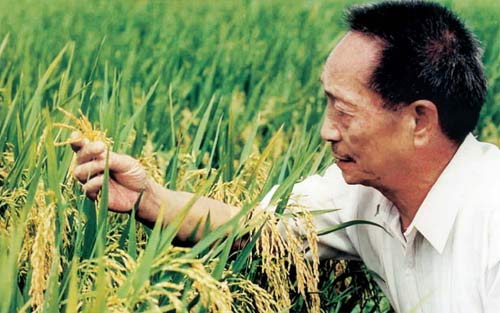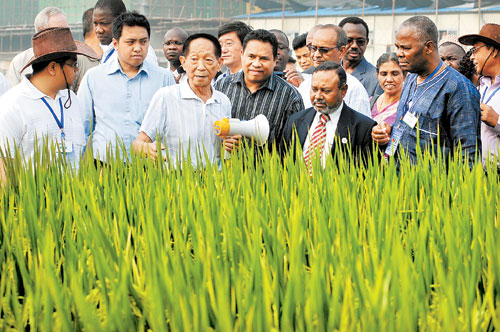


Yuan Longping
Yuan Longping, the “father of hybrid rice,” is one of the strongest symbols of peace in China and across the world. Yet it was not this renowned Chinese scientist who was bestowed with the Nobel Peace Prize, it was Liu Xiaobo, a Chinese dissident.
“By awarding the Nobel Peace Prize to Liu Xiaobo the Norwegian Nobel Committee wanted to underscore the fundamental connection between developing democracy and creating and securing peace,” said Norwegian Nobel Committee Chair Berit Reiss-Andersen.
That statement suggests a political motivation. Democracy is a powerful ideology that divides the world into two parts, with Western democracies on the “good” side and non-Western countries on the other side. People who subscribe to this ideology believe that Western democracies are superior to and generally more peaceful than any other regime type. This powerful ideology no doubt played a role in the Nobel Committee’s decision.
Chinese authorities argue that Liu Xiaobo had long engaged in illegal activities aimed at overthrowing the current government and undermining the current political system. He was sentenced in December 2009 to 11 years in prison for inciting subversion of state power. The 61-year-old man was released on medical parole and moved to a hospital in the northeast Chinese city of Shenyang where he died of multiple organ failure after being diagnosed with liver cancer.
The unfortunate situation has left many Chinese wondering why a prestigious international award that is meant to symbolize peace would be used promote a powerful ideology in China. “Why don’t they give [a] Nobel [Peace] Prize to this great man?” asked one reader on the People’s Daily Online website, after reading a story about Yuan Longping, who is leading a research to cultivate new strains of high yield "sea rice," a breed that can withstand water with a salinity of up to 0.8 percent, with a yield over 300 kilograms per mu (a Chinese unit equivalent to 666 square meters). “He achieved something great for 200 million people,” the reader added. “It’s people like him who deserve the Peace Prize,” a different reader replied.

Yuan Longping hosts agricultural officials from Asia and Africa to his hybrid rice research and testing field in Hunan province. (File Photo)
The comments make a point. Yuan Longping is a popular figure in China for his tireless fight against hunger. He developed the world’s first hybrid rice in 1974 and has received numerous national and international prizes and awards for his lifelong work to eradicate hunger. In 2004, he received The World Food Prize for developing the genetic materials and technologies essential for breeding high-yielding hybrid rice varieties. His pioneering research has not only helped transform China from food deficiency to food security within three decades, but has helped transform the world. Even farmers from the United States have benefited from his work.
Rice is a staple for a majority of the world’s population, including about 60 percent of China’s population. More efficient rice crops such as high-yielding hybrid rice play an important role in the battle against hunger—the root cause of many problems. The right to food is also a key human right, championed by the UN Food and Agriculture Organization. Norman Borlaug, the “Father of the Green Revolution,” and the founder of The World Food Prize, was awarded a Nobel Peace Prize for his lifetime of work to feed the hungry.
So why not award the “Father of Hybrid Rice” the Nobel Peace Prize? This question lingers in the mind of many Chinese who continue to see the role of the Nobel Committee as nothing more than a platform for advancing the world’s most powerful ideology.
 Fire brigade in Shanghai holds group wedding
Fire brigade in Shanghai holds group wedding Tourists enjoy ice sculptures in Datan Town, north China
Tourists enjoy ice sculptures in Datan Town, north China Sunset scenery of Dayan Pagoda in Xi'an
Sunset scenery of Dayan Pagoda in Xi'an Tourists have fun at scenic spot in Nanlong Town, NW China
Tourists have fun at scenic spot in Nanlong Town, NW China Harbin attracts tourists by making best use of ice in winter
Harbin attracts tourists by making best use of ice in winter In pics: FIS Alpine Ski Women's World Cup Slalom
In pics: FIS Alpine Ski Women's World Cup Slalom Black-necked cranes rest at reservoir in Lhunzhub County, Lhasa
Black-necked cranes rest at reservoir in Lhunzhub County, Lhasa China's FAST telescope will be available to foreign scientists in April
China's FAST telescope will be available to foreign scientists in April "She power" plays indispensable role in poverty alleviation
"She power" plays indispensable role in poverty alleviation Top 10 world news events of People's Daily in 2020
Top 10 world news events of People's Daily in 2020 Top 10 China news events of People's Daily in 2020
Top 10 China news events of People's Daily in 2020 Top 10 media buzzwords of 2020
Top 10 media buzzwords of 2020 Year-ender:10 major tourism stories of 2020
Year-ender:10 major tourism stories of 2020 No interference in Venezuelan issues
No interference in Venezuelan issues
 Biz prepares for trade spat
Biz prepares for trade spat
 Broadcasting Continent
Broadcasting Continent Australia wins Chinese CEOs as US loses
Australia wins Chinese CEOs as US loses